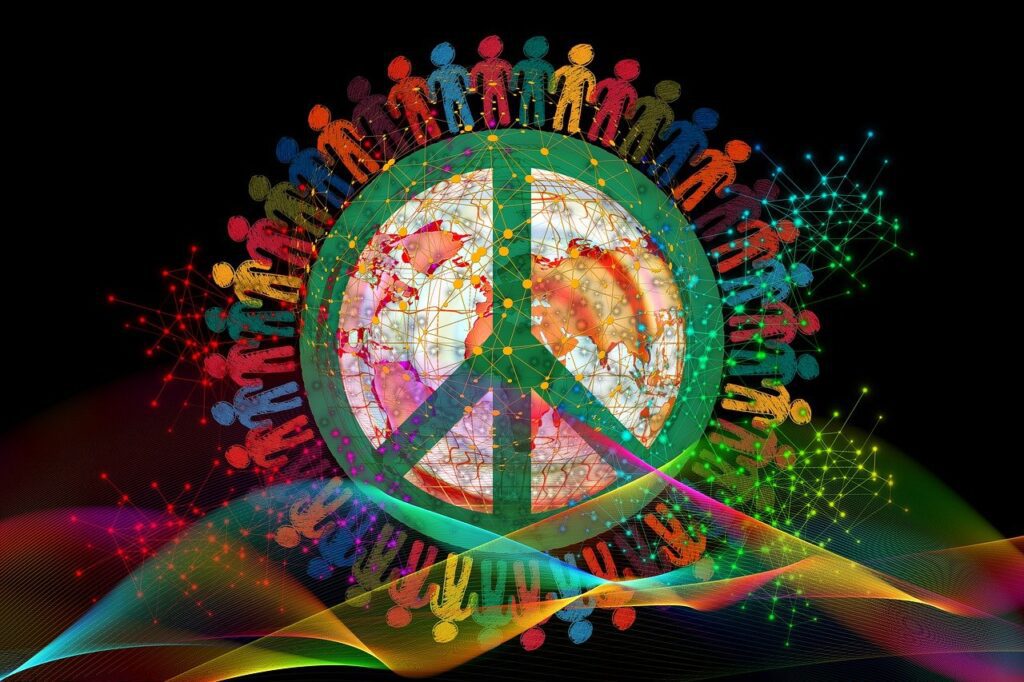Introduction
In a world that is increasingly interconnected, the concept of global citizenship has become more relevant than ever, especially by keeping in view the current international disputes, wars and hate incidents, racial, political and financial discrimination. As borders blur and our lives become intertwined through technology, trade, culture, and travel, it is crucial for individuals to embrace a sense of responsibility that transcends national, cultural, and religious boundaries. Global citizenship is about recognising our shared humanity, understanding the complex interdependencies that bind us, and taking action to create a more just, peaceful, and sustainable world.
Global Citizenship

Global citizenship is a mind set and a way of life that acknowledges the interconnectedness of all people and the planet. It goes beyond national identity or allegiance and encourages individuals to see themselves as part of a larger, global community. This does not mean abandoning one’s cultural roots or national pride; rather, it involves balancing these with an understanding of and commitment to global challenges such as poverty, inequality, climate change, and conflict.
Global citizens are aware of the world around them, respect and appreciate diversity, and are willing to engage with issues that affect people beyond their immediate environment. They recognise that their actions have global implications and are driven by a sense of responsibility to contribute positively to the world.
The future of humanity is unsustainable without collective action, especially given challenges like resource depletion, climate change, and unequal distribution of food and wealth. Working together, without discrimination or prejudice, is the only path forward to secure a better future for the next generations.
Why Global Citizenship
In today’s interconnected world, the challenges we face are no longer confined by borders. Issues such as climate change, pandemics, economic inequality, and political instability are global in nature and require collective action. The concept of global citizenship encourages us to move beyond narrow self-interest and think about how our actions impact others, fostering a sense of shared responsibility.
No single country possesses everything it needs, so collaboration and sharing are essential for the well-being of all. Promoting free trade, maintaining a balance of power, upholding mutual respect, ensuring equality, and respecting the sovereignty and borders of other nations can contribute to building a more compassionate and cooperative world.
Global citizenship also promotes empathy, understanding, and cooperation among people of different cultures and backgrounds. In a time when divisive rhetoric and nationalism are on the rise, embracing a global perspective can help counter these trends and promote a more inclusive, united world. By seeing ourselves as part of a global community, we are more likely to support policies and initiatives that benefit the common good, rather than just our immediate surroundings.
The Role of Education

Education plays a pivotal role in nurturing global citizens. Schools and universities are uniquely positioned to introduce students to the concept of global citizenship and equip them with the knowledge, skills, and attitudes needed to engage with global issues. This involves more than just teaching facts about other countries; it requires fostering critical thinking, encouraging empathy, and promoting an understanding of the interdependence of all nations and peoples.
Education should incorporate new trends that focus on globalization and highlight global issues such as peace, unity, prosperity, human rights, freedom of speech, equality, empathy, environmental sustainability, and social justice can inspire students to think beyond their own experiences and consider the broader impact of their actions. Experiential learning opportunities, such as study abroad programs, cultural exchanges, and community service projects, can also be instrumental in shaping global citizens. By exposing students to different cultures and perspectives, these experiences can help break down stereotypes and build a deeper appreciation for diversity.
However, education for global citizenship is not limited to formal schooling. Lifelong learning, through reading, travel, engaging in cross-cultural dialogues, and staying informed about global events, is equally important. In our increasingly digital world, online resources and social media can also play a significant role in broadening our horizons and connecting us with others around the globe.
Steps to Embrace Global Citizenship
While the concept of global citizenship may seem abstract, there are many tangible ways individuals can embrace this mind set and contribute to a more united and peaceful world. Here are some practical steps which may help to foster global citizenship:
- Stay Informed: Knowledge is the first step towards action. Make a habit of keeping up with international news and staying informed about global issues such as climate change, migration, poverty, and human rights. Understanding the complexities of these challenges can help you make more informed decisions in your personal and professional life. Seek out diverse sources of information, including perspectives from other countries and communities, to gain a more nuanced understanding of the world. Freedom of speech, a free press, unbiased reporting, and the right to information must be upheld and practiced.
- Sustainable Practices: Our consumption habits have a significant impact on the planet and people around the world. Embracing sustainable practices, such as reducing waste, conserving energy, and supporting fair trade, can make a difference. By choosing products and companies that prioritise ethical and environmentally friendly practices, you can help promote a more sustainable and just global economy.
- Volunteer for Global Causes: To volunteer your time and skills for supporting global causes is a powerful way to put global citizenship into action. This could involve working with local organisations that support refugees, advocating for environmental protection, or raising awareness about global issues in your community. Advocacy can also take the form of supporting policies and leaders who are committed to addressing global challenges and promoting international cooperation.
- Celebrate Diversity and Practice Inclusion: One of the hallmarks of global citizenship is an appreciation for diversity and a commitment to inclusion. This involves not only respecting cultural differences but actively seeking to learn from them. Whether it’s trying new foods, learning a new language, or engaging with people from different backgrounds, embracing diversity can enrich your own life and help foster a more inclusive world.
- Participate in Global Movements: There are many global movements and initiatives that aim to address issues such as climate change, human rights, and social justice. Joining these efforts, whether by signing petitions, donating, or participating in campaigns, can amplify your impact. For example, supporting the United Nations’ Sustainable Development Goals (SDGs) is a practical way to contribute to a global agenda for a better future.
- Cross-Cultural Understanding: Building bridges between cultures is a key component of global citizenship. Engage in conversations with people from different cultural backgrounds, listen to their stories, and share your own. This not only helps to break down stereotypes and prejudices but also fosters mutual respect and understanding. In an increasingly digital world, online communities and social media can be valuable tools for connecting with people globally and sharing diverse perspectives.
- Educate and Inspire Others: Global citizenship is a collective effort, and inspiring others to join in is an important part of the process. Share your knowledge, experiences, and passion for global issues with friends, family, and colleagues. Use your voice to advocate for global citizenship in your community, whether through social media, public speaking, or informal conversations. By raising awareness and encouraging others to think globally, you can help build a broader movement for change.
- Reflect on Your Privilege and Responsibility: Recognising one’s own privilege and the responsibility that comes with it is an important aspect of global citizenship. Reflect on how your own circumstances, such as where you were born or the opportunities you have had, have shaped your worldview. Use this awareness to empathise with others who may not have the same advantages and to guide your actions towards promoting equity and justice.
- Strict Compliance of United Nation’s Charters: It has been observed that the United Nations has struggled to implement its decisions in line with its charter, leading to disappointment among smaller and poorer nations. To avoid becoming an ineffective organization like the League of Nations, the UN must enforce its decisions, with all member states actively contributing to this effort. Decisions should be based on a majority vote, eliminating the veto power held by any single country. Additionally, the UN must ensure the equitable distribution of resources and provide support to poorer and developing nations in areas such as technology, healthcare, and education, enabling them to become self-sufficient. This approach would help foster prosperity, reduce crime, curb migration, and diminish hate and disease worldwide.
Technology in Advancing Global Citizenship

In the digital age, technology plays a critical role in fostering global citizenship. Social media, online learning platforms, and virtual communities allow us to connect with people across the globe, share ideas, and mobilise for change. Technology can help bridge gaps, provide access to information, and empower individuals to take action on global issues.
However, technology also presents challenges, such as the spread of misinformation and the risk of digital divides. As global citizens, it is important to use technology responsibly and critically. This includes verifying sources, being mindful of biases, and using digital tools to promote positive change rather than division.
Challenges and Barriers

While the benefits of global citizenship are clear, there are also challenges and barriers that can hinder its widespread adoption. One of the primary obstacles is the rise of nationalism and populism, which often emphasise division and “us versus them” mentalities. In some cases, political leaders and media may exploit fears of globalisation, immigration, and cultural change, leading to increased xenophobia and isolationism.
Economic inequality is another significant barrier. People who are struggling to meet their basic needs may not have the resources or time to engage with global issues. Additionally, access to quality education, technology, and opportunities for cross-cultural engagement can vary greatly, creating disparities in who can fully participate as global citizens.
To overcome these challenges, it is crucial to address the root causes of inequality and promote inclusive and equitable access to education and opportunities for all. This involves advocating for policies that reduce poverty, improve education, and bridge digital divides, as well as fostering environments that encourage dialogue and understanding rather than fear and division.
The Role of Governments, Businesses, and Civil Society

While individual actions are important, fostering global citizenship also requires the involvement of governments, businesses, and civil society. Governments can promote global citizenship through education policies, support for international cooperation, and by setting an example in addressing global challenges. Businesses have a responsibility to operate ethically and sustainably, considering the global impact of their practices and contributing to the well-being of communities worldwide.
Civil society organisations, such as non-profits, advocacy groups, and community organisations, play a critical role in raising awareness, mobilising action, and providing opportunities for individuals to engage as global citizens. By working together, these sectors can create a supportive environment that encourages and enables global citizenship at all levels of society.
Conclusion
Fostering global citizenship is not about abandoning our individual identities or allegiances; it is about expanding our sense of belonging to include the broader human family and the planet we all share. In a world that is increasingly interconnected yet often divided, embracing global citizenship can help us navigate the complexities of our times with empathy, understanding, and a commitment to the common good.
Each of us has a role to play in building a more united world. Whether through education, advocacy, sustainable living, or simply by reaching out to others with kindness and respect, we can all contribute to a global community that values justice, peace, and sustainability. By embracing global citizenship, we take a step towards a future where our differences are celebrated.






355 responses
**mind vault**
mind vault is a premium cognitive support formula created for adults 45+. It’s thoughtfully designed to help maintain clear thinking
The thoroughness in this piece is noteworthy.
This is the kind of content I take advantage of reading.
Thanks on sharing. It’s top quality. TerbinaPharmacy